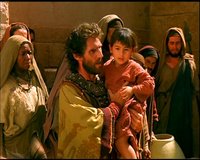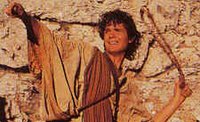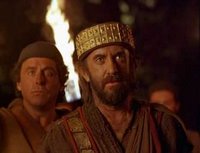 BBC Radio 4 has been broadcasting readings from Song of Songs juxtaposed with bits from Lamentations. The idea is to combine the most beautiful and erotic parts of the Biblical imagery with some of the most violent. I heard five minutes of it in the car at the weekend - somehow managing to catch what is probably the rudest part of Song of Songs - but liked the premise and the execution, and I'm hoping to listen to the rest soon via iPlayer.
BBC Radio 4 has been broadcasting readings from Song of Songs juxtaposed with bits from Lamentations. The idea is to combine the most beautiful and erotic parts of the Biblical imagery with some of the most violent. I heard five minutes of it in the car at the weekend - somehow managing to catch what is probably the rudest part of Song of Songs - but liked the premise and the execution, and I'm hoping to listen to the rest soon via iPlayer.Coincidentally around the same time that I heard about this production I also heard about a film called Song of Songs (2005) starring Natalie Press (Bleak House, Red Road). It's rated very poorly on IMDb (4.5!) though The Observer's Philip French and The Guardian's Peter Bradshaw both seemed to like it. 2005's Edinburgh Film Festival catalogue described it like this:
Devoutly religious Ruth returns from Israel to care for her dying mother, but when she tries to bring her estranged brother David back into the fold, in accordance with her mother's wishes, the result is a startling journey into the darkest realms of sexual obsession: a forbidden game under the guise of religious law. Dark, ambiguous and distinctly adult, this study of belief and desire, set in the cloistered world of London's Orthodox Jewish community, thoughtfully explores the links between faith and violence, denial and longing.Whilst words such as "dark" and "intense" seem to pop up in reviews of that film another film that takes a decent look at the book is at the other end of the scale. Keeping Mum, also released in 2005, is a comedy starring Rowan Atkinson and Dame Maggie Smith. It doesn't fare brilliantly at IMDb either (6.8), but I'm told by my friend (@lizzystevey) that it "has some beautiful scenes looking at the Song of Songs." I never saw it when it first came out, though was sorely tempted by the promise of Rowan Atkinson doing one of the things he does best - playing a vicar. I've ordered both films and may report back on them in due course.
Neither of these is a straight take on Song of Songs, but then that's partly because the poetic books don't really lend themselves to a medim such as film that is dominated by narrative. What has happened is that films about Solomon have included little excerpts here and there, usually around the time the Queen of Sheba turns up (as in The Bible Collection's brief quotation). It's been a while since I saw Solomon and Sheba so I can't comment on how much Song of Songs is included in there, but I'm pretty sure it will be cited somewhere amongst the cheesy Hollywood blather. There were at least 2 silent films about Solomon and the Queen of Sheba, but the 1921 Fox film is now lost, and I suspect that my review of Pathé's 1913 La Reine de Saba (Queen of Sheba) would have mentioned it if Song of Songs had been cited in the intertitles.



















